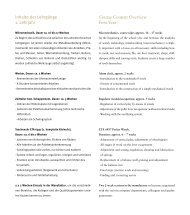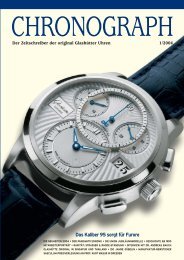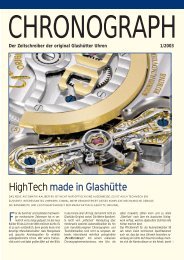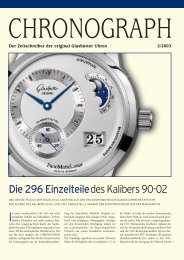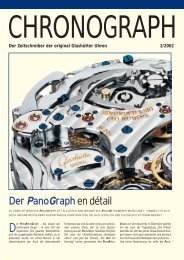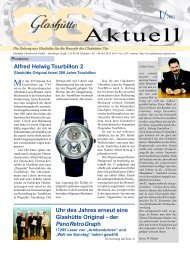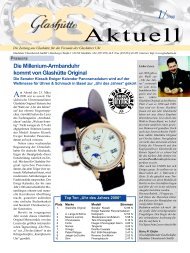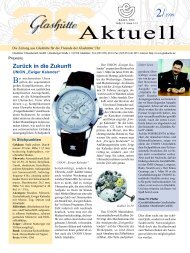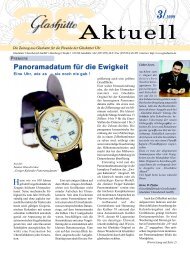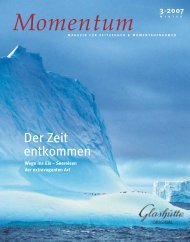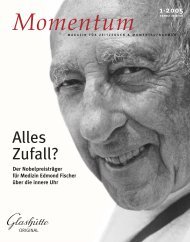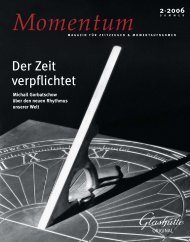2009 Momentum - Glashütte Original
2009 Momentum - Glashütte Original
2009 Momentum - Glashütte Original
You also want an ePaper? Increase the reach of your titles
YUMPU automatically turns print PDFs into web optimized ePapers that Google loves.
UTC + 0 | Greenwich<br />
The mother of all time measurement:<br />
Greenwich Mean Time, later<br />
replaced by Coordinated Universal<br />
Time (UTC)<br />
tant centres, Shanghai and Beijing. This means that in the far east<br />
of China, solar noon – when the sun reaches its zenith – actually<br />
happens at 11 a.m. and does not come to the westernmost parts<br />
of the country until 3 p.m.<br />
The example of China demonstrates aptly that time<br />
zones are often designated for purely political or economic reasons.<br />
Nepal, for example, likes to distinguish itself from in its giant<br />
neighbour India, and thus its clocks are a quarter of an hour<br />
ahead. In 2007 Venezuelan president Hugo Chávez put the clocks<br />
back half an hour, partly to better reflect the country’s geographical<br />
location, but also to differentiate Venezuela from the rest of<br />
the continent. Time-zone hopping has also become popular:<br />
many countries put their clocks forward by an hour in spring and<br />
back again in autumn in order to save energy. Thus where the UK<br />
has GMT and British Summer Time, most of the rest of Europe has<br />
Central European Time (CET) and Central European Summer<br />
Time (CEST). The fact that a large area of Europe shares a single<br />
time means that Vardø in the extreme northeast of Norway experiences<br />
its solar noon at 10:53 CET while in Cape Finisterre in<br />
north-western Spain the sun doesn’t reach its zenith until 13:37<br />
CET. In Portugal, on the westernmost reaches of Europe, children<br />
UTC -8 | Los Angeles<br />
Wannabe movie stars arriving in<br />
Hollywood from London have to put<br />
their watches back eight hours<br />
UTC - 1 | Greenland<br />
Don’t forget to wrap up warmly in<br />
eastern Greenland – and set your<br />
watch back by an hour<br />
UTC -9 | Alaska<br />
No, the hands of your watch haven’t<br />
frozen – they’re just nine hours behind<br />
London time<br />
UTC -2 | On the Atlantic<br />
When yachting in the middle of the<br />
Atlantic, you’ll have to adjust your<br />
chronometer by two hours<br />
UTC -3 | Rio de Janeiro<br />
Brazil stretches across three time<br />
zones. Rio, in the east of the country,<br />
is three hours behind of UTC<br />
were going to school in the dark even in the summer until the<br />
country changed its time to match that of Ireland and the UK.<br />
When the clocks went forward in Cuba in spring<br />
2004 they stayed there – an energy crisis extended that year’s<br />
summer time until autumn 2006. There were also serious economic<br />
considerations behind Singapore’s decision to bring its clocks<br />
in line with Hong Kong time; the stock exchanges of both cities<br />
now open and close at the same time. A special solution had to<br />
be found for Antarctica as it stretches over all 24 time zones. The<br />
decision was made that UTC would apply across the entire continent.<br />
UTC is the new name for what was formerly known as<br />
Greenwich Mean Time. Unlike GMT, it is an atomic timescale –<br />
measured by atomic clocks as opposed to astronomical calculations.<br />
It is used across the world for navigating by air and sea, in<br />
scientific experiments, in amateur radio, on many internet portals<br />
and in e-mails. Even the clocks on the International Space Station<br />
(ISS) are set according to UTC. The ISS takes 91 minutes to orbit<br />
the earth – that’s an incredible 17,400 mph. And that, my dear<br />
young friend from Boston, is a much greater speed than even the<br />
swiftest jet aircraft could ever hope to achieve. ✺<br />
UTC -10 | Hawaii<br />
Aloha and welcome to Hawaii!<br />
Please put your watch back ten<br />
hours<br />
UTC -11 | Samoa<br />
Appearances can be deceptive. The<br />
inhabitants of these idyllic isles<br />
love the rough and tumble of rugby<br />
– but kickoff is eleven hours earlier<br />
<strong>Momentum</strong> 1· <strong>2009</strong><br />
17



